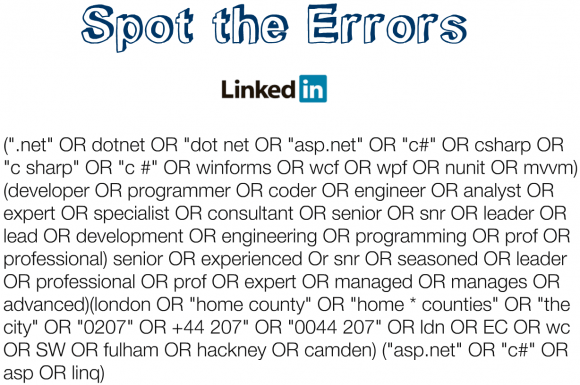Advanced Searching LinkedIn - How to: Identify Why Your Searches Are Getting No Results
As recruiters, LinkedIn is (or is certainly becoming) our main source of new candidates for roles we’re looking to fill. The search functions on LinkedIn are extensive and allow us to search for fairly specific skills, keywords, companies etc. for the kind of people who’ll be excellent for our vacancy.
However, many recruiters come across a stumbling block or two when they perform long and complicated searches, particularly when using Boolean operators for what should be an effective search.
This is generally because there’s something amiss with the operators (AND, OR and NOT) and moderators (quotations, brackets etc) that are contained within the string of terms.
Have a look at the search string below, and try and spot all of the errors contained within it:

Now, here are the rules of each operator and moderator:
AND – this operator, which must be written in capitals with spaces either side if it’s being used, is also represented as a space being left between two words, so it’s often omitted entirely. If you look in the address-bar after doing a search in LinkedIn, you’ll see each space or AND is represented by a + sign, so this means for every space you type, LinkedIn is looking for this AND that. When written in capitals, the search engine knows you’re looking for both of the two terms, rather than just writing the word and.
OR – This also must be written in capitals, and searches for this OR that, not necessarily both. In Google, it’s often represented by a bar like this | but that doesn’t work in LinkedIn. There must be a space both before and after the OR. Similarly to AND, when written in capitals, the search engine knows you’re looking for either of the two terms, rathe than just writing the word or.
NOT – This is often represented as the hyphen or minus – sign. If used as the letters in Capitals, there must be a space either side. When being used as a minus, it needs to be directly before the term you’re taking away (no space), like this: -recruiter.
” “ – Quotations are for when you’re searching for a specific term with two words or more, like “Sales Manager”, because without the quotes, the search will look for the term Sales and Manager but they may be represented anywhere on the page. Rules: They must open and close – ie, if you start a quotation, you must finish it after the terms you’re looking for. There should not be an AND, OR or NOT inside quotations.
( ) – Brackets, or Parenthesis are for grouping sets of terms. For instance, I want to search for someone who is a sales manager who is within the fashion retail sector, so all of my terms and synonyms that mean a sales manager (accounting for all of the variable job titles they could be called), and all of my terms relating to what means fashion retail, will be contained within two sets of brackets. Like this: (“sales manager” OR “sales team manager” OR “sales account manager”) (“fashion retail” OR “high street retail” OR “clothing retail” OR “fashion sales”) – Note, when you have two or more sets of bracketed terms, there must be a space between the two sets of brackets. Remember this is because a space means AND, and you’re looking for any one of the terms in the first set of brackets, AND any one of the terms in the second set of brackets. And like quotations, if you open a bracket, you have to finish it.
No other operators or modifiers work in LinkedIn. So if you’re using the asterisk (*) or tilde (~) in your search, LinkedIn will come up with no results.
Most of the time, LinkedIn will return no results when you search for a long and complicated search string that contains even just one error. It’s not like Google which will hazard a guess as to what you’re looking for! So while you may have given up on your search and thought there’s simply no one out there (that’s never the case!), take a step back from your search and look out for any potential errors you may have made.
Can you spot all of the errors within the string above? Let us know what they are in the comments – you never know, you could win a prize! Happy hunting!
